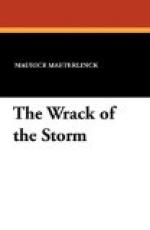4
It is not man’s life that is at stake, but the idea which he forms of the honour, the happiness and the duties of his life. To save his life he had but to submit to the enemy; the invader would not have exterminated him. You cannot exterminate a great people; it is not even possible to enslave it seriously or to inflict great sorrow upon it for long. He had nothing to be afraid of except disgrace. He did not so much as see the infamous temptation appear above the horizon of his most instinctive fears; he does not even suspect that it is able to exist; and he will never perceive it, whatever sacrifices may yet await him. We are not, therefore, speaking of a heroism that would be but the last resource of despair, the heroism of the animal driven to bay and fighting blindly to delay death’s coming for a moment. No, it is heroism freely donned, deliberately and unanimously hailed, heroism on behalf of an idea and a sentiment, in other words, heroism in its clearest, purest and most virginal form, a disinterested and whole-hearted sacrifice for that which men regard as their duty to themselves, to their kith and kin, to mankind and to the future. If life and personal safety were more precious than the idea of honour, of patriotism and of fidelity to tradition and the race, there was, I repeat, and there is still a choice to be made; and never perhaps in any war was the choice easier, for never did men feel more free, never indeed were they more free to choose.
But this choice, as I have said, did not dare show its faintest shadow on the lowest horizons of even the most ignoble consciences. Are you quite sure that, in other times which we think better and more virtuous than our own, men would not have seen it, would not have spoken of it? Can you find a nation, even among the greatest, which, after six months of a war compared with which all other wars seem child’s-play, of a war which threatens and uses up all that nation’s life and all its possessions, can you find, I say, in history, not an instance—for there is no instance—but some similar case which allows you to presume that the nation would not have faltered, would not at least, were it but for a second, have looked down and cast its eyes upon an inglorious peace?
5
Nevertheless, they seemed much stronger than we are, all those who came before us. They were rude, austere, much closer to nature, poor and often unhappy. They had a simpler and a more rigid code of thought; they had the habit of physical suffering, of hardship and of death. But I do not believe that any one dares contend that these men would have done what our soldiers are now doing, that they would have endured what is being endured all around us. Are we not entitled to conclude from this that civilization, contrary to what was feared, so far from enervating, depraving, weakening, lowering and dwarfing man, elevates him, purifies him, strengthens him, ennobles him, makes




